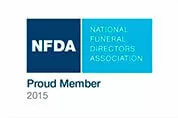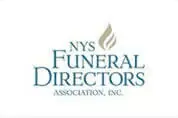When should the funeral take place?
By Jewish law and custom, the burial should take place as soon as possible, preferably within 24-48 hours of death. When this is not feasible, Jewish law requires one to complete the arrangements as expeditiously as possible.
Where should the service take place?
Most funeral services take place in the chapel at the funeral home. A chapel service is not subject to the vagaries of the weather, or other outside distractions.
There are, however, times when an alternative location might be appropriate. If, for example, only a very few people will be attending, or because of geographical considerations, one might choose to hold the service at the gravesite. If the deceased had been an active member of a synagogue, the service might take place there. Our staff and your Rabbi will be able to advise you.
What Day of the Week and Time of the Day are Best?
Naturally, the answers to this question depend on the location you’ve selected, and the schedules of those you wish to attend. If you have concerns about the weather, an indoor service is probably a good choice.
What type of service should I have?
If no pre-arrangements have been made, the type of service is entirely up to you. Services are usually held at a funeral home or a place of worship. There are different types of services, ranging from a traditional religious or military service to something a little more non-traditional. Our funeral directors are more than happy to work with you to figure out what would be the most appropriate.
Can I personalize a funeral?
Of course, you can, in fact more and more people are opting for a more non-traditional personalized service. There is no right or wrong way to celebrate somebody’s life. There are many unique ways to celebrate life, let the funeral director know exactly what your desires are and they will honor your wishes.
Who Will Officiate the Service?
You can choose to have your own family rabbi or cantor officiate at the service. If you are not affiliated with a congregation, we will be able to select a rabbi for you. Some families choose not to engage any clergy and instead have a more informal gathering.
When can I notify relatives and friends of the service time and location?
Details of the service should not be made public until both the rabbi and the funeral director confirm the time and place of the service.
What if I belong to a “Society”?
We will coordinate all details with any burial society, landsmanschaft, organization or congregation of which you may be a member. We will secure all necessary permits and signatures, and make sure that you receive all benefits to which you are entitled.
How do I prepare for the service?
If the rabbi or cantor is the only speaker, then your meeting with them will provide all the information necessary for the eulogy. If others in the family, or friends, plan to speak, then they will make the necessary preparations.
You should plan to be at the funeral home approximately an hour before the scheduled start of the service (note that funeral services almost always start exactly on time!) in order to take care of any unfinished paperwork, make an identification of the deceased (if desired), and to be available to acknowledge friends and family coming to the service.
What should I wear?
There is no prescribed “funeral attire”, nor must the clothing be black. You should wear comfortable, yet dignified attire, appropriate to the occasion, a religious ceremony commemorating the life of your loved one.
How long does the service take?
The “average” funeral service at the chapel, with only the rabbi or cantor speaking, usually takes 20-30 minutes. If others will be speaking, the length of the service obviously, then, depends on them. If there are multiple speakers, the service could take an hour. Please advise the clergy and our staff if there will be additional speakers.
Is it appropriate to send flowers?
Jewish tradition teaches equality among men and women and asks that even at the time of death, no distinction be made between the rich and poor. Any sign of ostentation is discouraged and, therefore, flowers are to be avoided. In addition, flowers are typically used for joyous occasions, and are seen as inappropriate at a Jewish funeral.
Usually a memorial contribution to a charitable cause will be listed as an alternative to sending flowers. This is a way to honor the deceased that is a preferred and lasting remembrance for the family.
Do we need to have an obituary notice and what is included in one?
It is highly recommended to have an obituary notice that’s either placed in a local newspaper, or placed online. An obituary lets the public know that a death has occurred, and gives them information about the service. Obituaries generally include the deceased’s full name, age, city and date of birth and the city they were living in when they died. It also includes the name of the deceased’s spouse, along with the names of anyone else significant in their lives, such as parents, children or grandchildren. Space may be limited in a newspaper obituary, but you may include a little blurb on the life and legacy of the deceased. Please note, all newspapers charge by the line and can be very expensive. We offer a free online obituary on our website, where you have an opportunity to add a lot more about the deceased (in addition to photos).
What is the procedure at the cemetery?
The burial in the ground (k’vurah b’karka) is the most important part of the funeral. Therefore, everyone who is able should make every effort to “accompany the deceased” to the cemetery. Upon arrival at the cemetery and filing the papers at the office, the procession will continue to the gravesite, where the casket is carried to the grave, accompanied by the family and friends. After lowering the casket, it is then appropriate for all present to participate in the actual burial by shoveling earth into the grave, as it is the primary responsibility of the family and the community. As different clergy have differing standards and procedures they follow, please take direction from them.
How long does it take?
The service at the cemetery, depending upon which prayers need to be recited and how much of the grave is to be filled in, could take from 15-45 minutes.
What happens if the death occurs in the middle of the night or on the weekend?
We are here to help, funeral directors are available 24 hours a day, 7 days a week, and 365 days a year.
What if a death occurs away from my home town?
We are here to help, we can arrange to have the remains transported home from anywhere in the world. We will assume responsibility and make the proper arrangements to have the remains return to the community.
As one of New York’s oldest members of The Jewish Funeral Directors of America and KAVOD, Independent Jewish Funeral Association, we have forged life-long professional and personal relationships with Jewish funeral directors across the country. We can assist your family in the event a death occurs away from home or if final disposition is in another city.
How much does a funeral cost?
The cost of the funeral varies depending on the wishes you have. The average cost of a funeral is between $3,000-$7,000, however, the most basic of services can cost as little as $2000. The cost includes all professional services including transportation, preparations, the use of a facility for the ceremony, and the purchase of a casket or urn.
Why are funerals so expensive?
Funerals are labor intensive and require a lot of work from a lot of people. The cost of a funeral goes beyond merchandise such as caskets, it includes the services of a funeral director in making the necessary arrangements, filling out forms, and dealing with all the other people involved in the death (doctors, lawyers, insurance companies). Funeral directors work an average of 40 hours per funeral. The cost of operating a funeral home is factored into the cost as well. Funeral homes are a 24-hour operation, with extensive facilities that need to be maintained and secured.
Who are funeral directors and what do they do?
Funeral directors are in charge of all the logistics following a death. They complete all the necessary paperwork, make arrangements for the transportation of the body, and put into action the choices made by the family in regards to the funeral service and the final resting place of the body. Beyond the logistics, funeral directors are there to provide moral support and guidance for someone coping with death.







